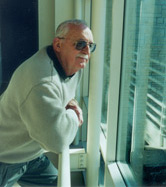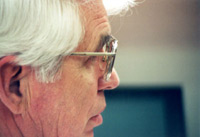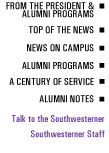A
Century of Service: Charlton, Thompson, Wilgers
They
are braided through the life of Southwestern College like ribbons, these
three professors. All were fresh young faculty members in the mid-'60s,
when returning Vietnam veterans made their classrooms occasionally intimidating,
but almost always exhilarating. Through the years the faces that have
stared back at them as they studied biology, or Chaucer, or world politics,
have belonged to baby boomers, and Gen-Xers, and now to the children
of their early students.
As
different as these three professors are, it is these students they point
to as their lives' greatest satisfaction.
They
have shaped and influenced and mentored for a total of 100 years-a century
of service that will evolve to its next phase when they retire this
year:
 Judith
Charlton, who returned to her alma mater in 1965 after serving in
the Peace Corps in Africa. She taught English, African studies, and
integrative studies courses, sharing her passion for books with anyone
who ventured into her office. If books could talk, the noise in this
third-floor Christy warren would be deafening; volumes pack the floor-to-ceiling
shelves, and spill off piles on her desk, on the floor, on the windowsill.
They must be moved off chairs, and Judith loves them. "Isn't this gorgeous?"
she exclaims as she unfolds a detail of a Van Gogh. "Take it-look at
it." But books aren't her primary passion. "I have loved teaching. I
don't like all the garbage that goes along with it, but I love learning
and I love telling people what they should know." And she throws her
head back and laughs at herself with a vigor that brings dust motes
cascading down from the shelves.
Judith
Charlton, who returned to her alma mater in 1965 after serving in
the Peace Corps in Africa. She taught English, African studies, and
integrative studies courses, sharing her passion for books with anyone
who ventured into her office. If books could talk, the noise in this
third-floor Christy warren would be deafening; volumes pack the floor-to-ceiling
shelves, and spill off piles on her desk, on the floor, on the windowsill.
They must be moved off chairs, and Judith loves them. "Isn't this gorgeous?"
she exclaims as she unfolds a detail of a Van Gogh. "Take it-look at
it." But books aren't her primary passion. "I have loved teaching. I
don't like all the garbage that goes along with it, but I love learning
and I love telling people what they should know." And she throws her
head back and laughs at herself with a vigor that brings dust motes
cascading down from the shelves.
Max
Thompson, whose intellect has made him the foremost expert on Kansas
birds and a nationally- known
judge of orchids, but whose proudest accomplishment is the rapport he
has developed with students. As he looks through the collection of bird
skins he developed over the years he see beyond feathers. "When I look
at the skins I see the names of students who were dedicated and hard-working
and never quibbled about what they were asked to do," he says. And the
friendship has been returned; like the other two retiring professors,
he has seen the children of his early students pass through more recent
classes. Nearly as important as his teaching and mentoring of students
have been his tireless advocacy of the college. His friendship with
Tom Mastin, who had no ties to Southwestern before he met Max, resulted
in the endowment of the prestigious Mastin Scholarship, a million-dollar
commitment.
known
judge of orchids, but whose proudest accomplishment is the rapport he
has developed with students. As he looks through the collection of bird
skins he developed over the years he see beyond feathers. "When I look
at the skins I see the names of students who were dedicated and hard-working
and never quibbled about what they were asked to do," he says. And the
friendship has been returned; like the other two retiring professors,
he has seen the children of his early students pass through more recent
classes. Nearly as important as his teaching and mentoring of students
have been his tireless advocacy of the college. His friendship with
Tom Mastin, who had no ties to Southwestern before he met Max, resulted
in the endowment of the prestigious Mastin Scholarship, a million-dollar
commitment.
 Larry
Wilgers, the only one of the three retirees who didn't graduate
from Southwestern-"It was pretty accidental," he says of the path that
brought him to the college's history faculty in 1968. But here his path
intersected with that of Alfredo Rodriguez, "one of the most aggravating,
the most interesting, and most challenging people who ever happened
to me." And from this encounter this Kansas boy developed a world view
that suffers along with every suffering person. "I've said to students
that I don't have many things I can share with them, but that somehow,
one way or another, we have to learn to try our best to see the world
through the eyes of other people." Minority students often chose Wilgers
as the faculty member who best empathized with their role on campus.
Larry
Wilgers, the only one of the three retirees who didn't graduate
from Southwestern-"It was pretty accidental," he says of the path that
brought him to the college's history faculty in 1968. But here his path
intersected with that of Alfredo Rodriguez, "one of the most aggravating,
the most interesting, and most challenging people who ever happened
to me." And from this encounter this Kansas boy developed a world view
that suffers along with every suffering person. "I've said to students
that I don't have many things I can share with them, but that somehow,
one way or another, we have to learn to try our best to see the world
through the eyes of other people." Minority students often chose Wilgers
as the faculty member who best empathized with their role on campus.
Now
these three professors will begin different relationships with Southwestern
College. Charlton will move to Independence, Mo., where her family ties
are strongest. Thompson plans an update of his Birds of Kansas books,
and will continue to operate SC's greenhouse.
Wilgers
will continue to live in Winfield. He pronounces his valedictory:
"In
spite of sometimes feeling that I was living very critical of everything,
and other people thinking I was always very critical of everything,
it's been a good trip. I can't imagine myself in another workplace where
I could have had as much freedom to do what I want to do and say what
I want to say. If that's what you're looking for, it's an ideal place."
-by Sara Severance Weinert
Judith
Charlton
 Tribute
by Tribute
by
Patti Calvert '00
Calvert graduated in December 2000 and is applying
to graduate schools. She hopes to earn a master's degree in English |
I
first met Judith Charlton in the spring of 1999 as I was taking the
necessary steps toward gaining admission to Southwestern. My assigned
advisor was off campus that day, and Judith inherited the dubious task
of sorting through my transcript and making pre-enrollment suggestions.
I had spent the previous year in a much larger school, and had become
resigned to the anonymity that a large university provides. When I went
to Judith's office that day, I was expecting the sort of student/instructor
meeting to which I had been accustomed-a short meeting, 15 minutes at
most, during which the instructor would look through my papers, make
a few suggestions, send me on my bewildered way, and promptly forget
about me. I am happy to say that my meeting with Judith did not go as
I expected.
I
spent the better part of an hour in Judith's office that afternoon.
While she did offer me academic counsel, we spent most of the time just
chatting, mostly about me. I discovered then that Judith was a questioner;
she asked me about my life, my background, and my plans for the future,
and seemed genuinely interested in my answers. By the time our meeting
was over, she knew most of my life's circumstances; she knew my son's
name, age, and facts about his life and personality; she knew my parents'
occupations and where they resided. I left Judith's office with my transcript,
a stamp set that she'd given me for my son, and the feeling that I had
chosen the perfect school for my needs.
But
even more remarkable than the fact that Judith took the time to learn
so much about me was the fact that she didn't forget what she'd learned.
When I walked into her Classical Mythology course the following August,
she greeted me: "How was your move to Winfield, and how's your son,
Timothy? Did you get him enrolled in first grade?"
As
the course progressed, I had the opportunity to learn
more about Judith. I learned that, although she spends her life teaching,
she is also a perpetual student. I remember her saying that when a person
stops learning, she/he might as well
stop living. (This is paraphrased; she probably said it much more eloquently
than I.) I learned that
she is a strong, capable woman-she was an independent woman when independent
women were not readily accepted in most circles. While this might have
caused heartache
at times, we who know her know that adversity certainly didn't stop
her. Like the literature she teaches, Judith is a classic-strength,
curiosity, and compassion are qualities which will always be admired,
and by which the Southwestern family will always remember Judith Charlton.
Judith, I thank you, my son thanks you, and my bookshelves thank you
(they're nice and full now). Good
luck on the next leg of your journey, and God bless you.
Larry
Wilgers
 Tribute
by Tribute
by
Todd Diacon '78
Todd Diacon earned a Ph.D. in Latin American
history from the University of Wisconsin-Madison and is now director
of Latin American Studies at the University of Tennesse |
Here's
the greatest lesson Larry Wilgers taught me: You should choose as your
profession that which makes you happy. I don't remember him actually
telling me this. In fact I'm sure he did not. He didn't have to. Instead,
one only had to observe how much Larry enjoyed teaching. And like all
great teachers, Larry loved to learn. In fact, that's what teaching
was for him: expressing his love of learning to his Southwestern students.
If Larry became interested in something, be it the environment, or global
capitalism and multinational corporations, or whatever, you too, as
his student, were soon drawn into that subject.
I
don't remember exactly what I had written, but on one of my papers Larry
scribbled "This is slang, never use it again in a paper." To my knowledge,
I never did make that mistake again. You see, Larry Wilgers pushed students
to improve their writing. He encouraged us to develop critical thinking
skills. Studying with Larry meant that coursework became a treat, and
not a burden, because we too were now learning. In other words, Larry
Wilgers embodied the benefits of a liberal arts education at a small
college.
A
herd of copying machines fill a room in the basement of Christy Hall
today. That's a shame, for in that room I experienced much of my learning
at Southwestern College. No, it wasn't a classroom. It was a break room,
a faculty lounge of sorts, where one often encountered Larry and Alfredo
Rodriguez, and Dan Daniel and Troy Boucher. Over endless cups of coffee,
students and their professors discussed the world's problems and the
day's burning issues. In that room interested students were welcomed
and made to feel that their opinions and knowledge were important. And
in that room I came to realize that for Larry class was always in session.
I guess that is what I think is special about Southwestern:
Class
is always in session.
Max
Thompson
 Tribute
by Tribute
by
Rick Johnson '69
Rick Johnson is director of career services
at Bethany College in Lindsborg. |
During the first
January Interterm for Southwestern College in 1969 and midway through
my senior year, I traveled with approximately 25 other biology majors
under the leadership of faculty members Max Thompson and Bob Wimmer
to New Mexico and Arizona to study desert life. Little did I know that
this would be the beginning of a lifelong friendship with Max.
In 1969 he was
relatively new on the Southwestern biology department faculty, but was
nonetheless very impressive to most of us for how much he knew, especially
about birds! That spring semester, Max hired me to "put up bird skins"
for the Southwestern study collection. He taught me the fine art of
scraping the fat from the skins without tearing them. I remember a Saturday
field trip that Max had organized to Cheyenne Bottoms near Great Bend
where we observed many different species of migratory birds. He also
took some of us with him in the early morning hours to check the bird
nets that he had set in wooded areas around Winfield to band birds for
research purposes. During spring break of that same semester he took
a few of us with him to the Oklahoma panhandle to collect mammals and
birds for the college collection. In all these settings Max not only
shared his knowledge about birds and biology, but he became a friend
to us as well.
Due to his encouragement
and international connections, three of us spent the summer of 1969
in the Bering Sea blubbering fur seal hides for the U.S. Department
of Commercial Fisheries. For the Kansas farm kid that I was, that summer
work experience was unforgettable and expanded my view of the world.
I would not have had this experience, had it not been for Max Thompson.
Max continued to
influence and assist our family in a variety of ways after my wife,
Rita (Webster) '70, and I graduated from Southwestern. In 1972 he recommended
me for an admissions counselor position opening with Southwestern. During
the next three years while I worked for the college, Max was a caring
friend toward our family. For example, during my first year when Rita
was pregnant with our first child and I was gone on recruiting trips,
Max would check on her from time to time.
I respect Max Thompson
greatly for his intellect about birds, orchids, and biology in general,
but most especially I respect his lifelong commitment to Southwestern
College. His continuing efforts in fund-raising, planning, and shepherding
the building of the remarkable new science hall are part of his great
achievements for the college.
Finally I am grateful
for having had the privilege of sharing a lifelong friendship with Max.
He has enriched my life first as a professor and then more importantly
as a friend.
